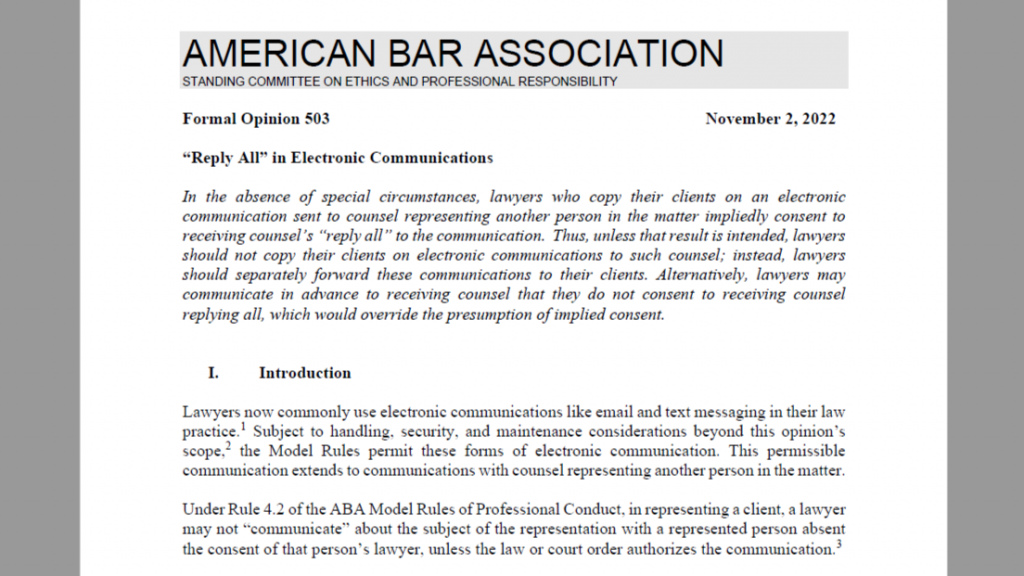
I have said it before and I will say it again: So much of legal ethics is simply common sense. If a lawyer wants to avoid ethical trouble, think before you act.
That would seem to be the case with copying your clients on emails to your opposing counsel. There are various reasons why that is a bad idea, but one in particular is that the opposing counsel can then “reply all” and copy your client on the response.
Apparently, this is enough of a problem that the American Bar Association’s Standing Committee on Ethics and Professional Responsibility chose to issue a formal opinion on it this week.
In ABA Formal Opinion 503 , issued Nov. 2, the committee tackles the weighty issue of “reply all” in electronic communications.
The ethics issue at play here is the prohibition against a lawyer directly contacting the client of the opposing lawyer in a matter.
But if Lawyer A sends an email to Lawyer B and copies Lawyer A’s client, has Lawyer A impliedly consented to Lawyer B sending back a reply-all response that includes the client?
According to the opinion, several states’ ethics panels have considered this issue and decided that copying the client is not to be taken as implied consent to a reply-all response.
But the ABA committee disagrees with those state panels, concluding that copying a client on emails and texts is implied consent to a reply-all response.
“We conclude that given the nature of the lawyer-initiated group electronic communication, a sending lawyer impliedly consents to receiving counsel’s ‘reply all’ response that includes the sending lawyer’s client, subject to certain exceptions discussed below. Several reasons support this conclusion, and we think that this interpretation will provide a brighter and fairer line for lawyers who send and receive group emails or text messages.”
The ABA committee analogizes copying one’s client on an email to inviting the client to a videoconference or in-person meeting.
“Similar to adding the client to a videoconference or telephone call with another counsel or inviting the client to an in-person meeting with another counsel, a sending lawyer who includes the client on electronic communications to receiving counsel generally impliedly consents to receiving counsel ‘replying all’ to that communication.”
The committee further reasons that placing the burden on the initiator of the email exchange is the fairest approach.
But the committee goes on to say that the presumption of implied consent to a reply-all response is not absolute.
If, for example, the sending lawyer expressly states that the lawyer is not consenting to a reply-all response, that would override the presumption of implied consent.
Also, the presumption applies only to email communications that the lawyer initiates. It does not apply to paper communications, for example.
“Implied consent relies on the circumstances, including the group nature and other norms of the electronic communications at issue.”
So what should a lawyer do when the lawyer wants to copy the client on an email?
Remember what I said above about common sense?
“Forward the email or text to the client separately,” the ABA advises.